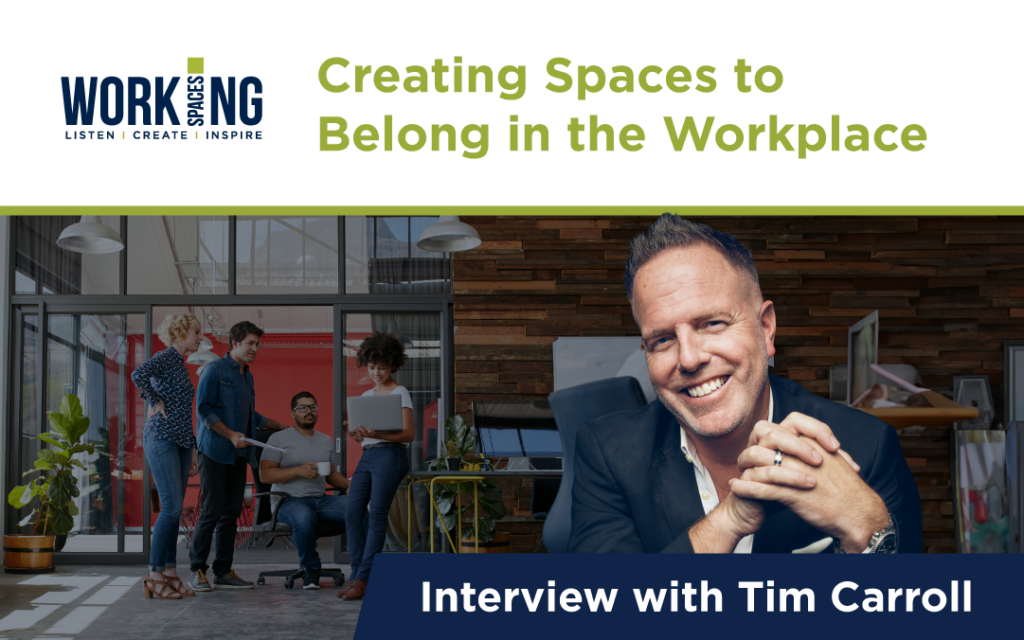
In an evolving landscape where individuals have the freedom to select their work settings, the workspaces that promote fair, inclusive, welcoming, and flexible environments have become the focus of desirable workplaces. As organizations have transitioned back to the office post-pandemic, there’s a renewed focus on establishing environments that prioritize connection, inclusivity, and overall well-being.
Tim Carroll, COO at Working Spaces and a thought leader in workplace culture and design offers invaluable insights into this paradigm shift, emphasizing the importance of returning to the office while catering to individual needs.
Belonging: The Heart of Workplace Culture
“Belonging in the workplace is the best way to create a case for why people should return to the office.”
Carroll’s vision aligns with the broader mission of establishing workplaces as more than just places to work—they become communities where individuals thrive and contribute to a shared purpose.
He underscores the idea that fostering a sense of belonging goes beyond physical space; it’s about creating an environment where employees feel valued, connected, and inspired to do their best work.
Prioritizing Health and Well-Being
“A well-designed space can allow individuals to leave healthier than they arrived.”
Emphasizing the holistic impact of well-designed spaces on employees’ health and well-being, Working Spaces champions a comprehensive approach that extends beyond mere aesthetics. Their philosophy emphasizes the integration of various elements within the workspace, such as furniture designed for comfort, abundant natural light, and thoughtfully planned spatial layouts. By incorporating features like sit-stand desks and strategically arranging communal areas to encourage collaboration and movement, Working Spaces actively creates an environment that not only supports physical health but also inspires cognitive rejuvenation and emotional well-being among employees.
Moreover, Carroll recognizes the role of technology in supporting hybrid work models while emphasizing the importance of maintaining office presence for fostering collaboration and connection.
Flexibility and Inclusivity: Key Pillars of Workplace Success
In embracing the future of work, organizations must prioritize flexibility and inclusivity.
But that’s more easily said than done. Standing true to their philosophy of excellence and expertise, Carroll shares the strategy they tested internally at Working Spaces.
“We wanted to try everything because we wanted to understand how every organization needs to find its best cadence. At Working Spaces, we tried everything—and discovered that one day a week is our sweet spot for balancing remote work and in-office collaboration.”
He stresses the need for consistency in remote work policies to avoid creating two different workplace cultures.
By providing employees with choice and control over where and how they work, organizations can empower individuals to thrive in diverse work environments while fostering a strong sense of belonging.
Leadership’s Role in Cultivating Workplace Culture
Effective leadership is pivotal in cultivating a workplace culture centered on belonging and well-being. Carroll advocates for regular touchpoints, cross-functional team interactions, and employee surveys to ensure that every individual feels heard and valued.
By creating opportunities for open communication and collaboration, leaders can cultivate an organizational culture where every individual feels valued, heard, and empowered. This promotes a sense of collective purpose and belonging, as employees are encouraged to share their ideas, concerns, and feedback freely. Through regular team meetings, brainstorming sessions, and forums for constructive dialogue, leaders can break down silos and facilitate cross-departmental collaboration, sparking innovation and creativity. Transparent communication channels and platforms for idea exchange enable employees to understand the broader vision and goals of the organization, aligning their efforts towards a common mission.
Unlock the Full Potential of Your Workspace
As we look toward the future of work, Tim Carroll’s insights remind us of the transformative power of creating spaces to belong. By investing in fair, welcoming, and flexible workplaces, organizations can unlock the full potential of their workforce and foster a culture of innovation, collaboration, and belonging.
Let us embrace this future-forward approach, building workplaces where everyone can thrive.
To learn more, contact the team at Working Spaces today.
